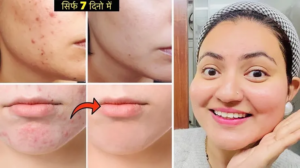Skincare is expensive and can burn a massive hole in your pockets. There are times when you buy skincare, but it does not suit you.
You experience sudden breakouts. Sometimes your skin dries, sometimes it makes your skin greasy, and sometimes it irritates the skin!
In this blog post, we’ll learn in detail what are different skin types and how can you find out your skin type.
Table of Contents:
Why Is It Important To Know Your Skin Type?
Any dermatologist will inform you of how crucial it is to make sure that any skin care products are selected with consideration for your skin type.
The product won’t be as effective and may exacerbate or even create new conditions if it isn’t the perfect fit for your skin type.
It is crucial to know your skin type before buying anything for your skin, including a moisturizer or cleanser.
How much water and oil your skin contains determines the type of skin you have. Your skin will experience problems if these are out of balance.
If your skin is very oily, it may be more likely for you to get acne breakouts and will look shiny.
Oil-free and maybe containing substances that might help rebalance the amount of oil in your skin, skin care products made for oily skin will be oil-free.
What Are Different Skin Types?
1]. Oily Skin
Oily skin makes you feel greasy and sticky!
The T-zone (forehead, nose, and chin) is affected by oily skin, which produces excessive sebum that gives the face a shiny appearance and greasy sensation.
Those with oily skin get fewer wrinkles!
Do not mistakenly believe that just because oily skin produces more natural oils, it requires less moisture than other skin types.
The key to nourishing and hydrating oily skin without blocking pores or causing breakouts is to use the proper products.
A gentle cleanser effective in removing debris, extra oil, and other pollutants should be a part of the ideal oily skin routine.
It should also contain a lightweight moisturizer that is non-comedogenic, oil-free and gives your oily skin the vital hydration it requires.
2]. Dry Skin
Dry skin feels dehydrated.
Water loss in the skin is the cause of dry skin. Compared to other skin types, dry skin often produces fewer natural oils.
As a result, it could start to look dull and feel rough, flaky, or even scaly.
It frequently feels constrictive or less elastic, is dehydrated, and may be more prone to developing more obvious fine wrinkles. It could also get inflamed or scratchy.
Avoid taking too long and hot showers, moisturize frequently throughout the day, and choose skincare products that are alcohol-free, fragrance-free, and non-comedogenic.
3]. Normal Skin
If you have a normal skin type, you are blessed.
Balanced skin doesn’t feel either too dry or overly greasy. It does not easily break out, become flaky, or feel tight or oily.
Small pores, smooth skin, and a reduced propensity for sensitivity are all characteristics of individuals with normal skin.
Normal skin still needs good maintenance, even when it doesn’t have any particular problems or concerns, to look and feel its best.
The optimum normal skincare routine supports your skin’s protective barrier while also retaining moisture to assist in keeping your skin hydrated.
4]. Combination Skin
People with combination skin find it difficult to make a perfect skincare routine. Some areas of the skin remain oily, while some areas feel dry.
The T-zone, which is frequently oily, and the cheekbones, which are either dry or normal, are examples of places with combination skin that has both dry and oily patches.
Because of several causes, including stress and hormone fluctuations, this skin type can change throughout the year and with the seasons.
Care for skin that is oily or normal in some areas and dry in others requires effective cleansing and hydration.
5]. Sensitive Skin
The term “sensitive skin” is frequently used to refer to various skin types, including normal, dry, and oily sensitive skin.
No matter what kind of skin you have, if it’s sensitive, it may seem red and feel dry, itchy, or burning.
These symptoms may be caused by having skin that is more sensitive to external irritants and may be brought on by specific chemicals, such as colours or fragrances, as well as environmental variables.
If you have sensitive skin, you might be able to identify the elements that aggravate it and avoid using cleansers, moisturizers, or other products that contain those particular compounds.
To decrease your exposure to triggering substances, you can also change your environment.
How To Know Your Skin Type?
You can consult a dermatologist to understand your skin type. A dermatologist can help you understand your skin problems and design a skincare routine best suited for your skin.
You can understand and know your skin type at home as well.
Wash your face using a gentle cleanser and pat dry. Wait for 30 min and see the results. Here is what you need to watch out for:
-
You probably have oily skin if it appears shiny throughout.
-
You probably have dry skin if it is flaky or scaly, feels tight, or both.
-
If your T-zone is the sole area that shines, you most likely have a combination skin.
-
You probably have normal skin if it feels moisturized, pleasant, and non-oily.
It’s crucial to keep in mind that all skin types might be sensitive or prone to acne outbreaks, though those with normal skin may be less likely to do so.
But with the correct products, you can take care of your skin while dealing with issues like sensitivity and acne scars.
If you are still in doubt, seek the advice of a board-certified dermatologist for a customized skin analysis and advice on the most effective skincare regimen for your skin type.
Conclusion:
Understanding your skin type will help you choose the correct products and do the correct remedies. So, do the test, find your skin type and build routines and rituals that fit you.
How To Take Care of Skin During Summer | Monsoon Skin Care Tips
How To Take Care Of Skin During Summer – Best Summer Skin Care Routine
If you’re not a part of our amazing family, you’re missing out. Join us today and start your natural skincare and haircare journey and get help from other community members. 😊



